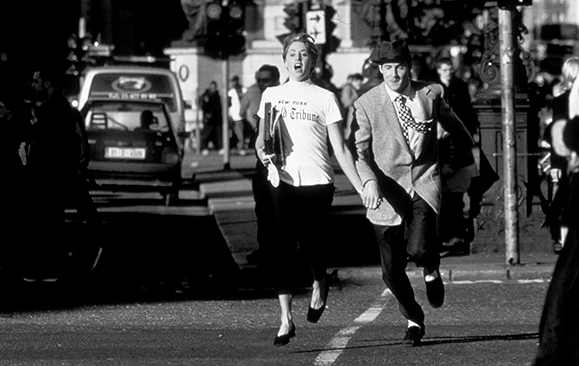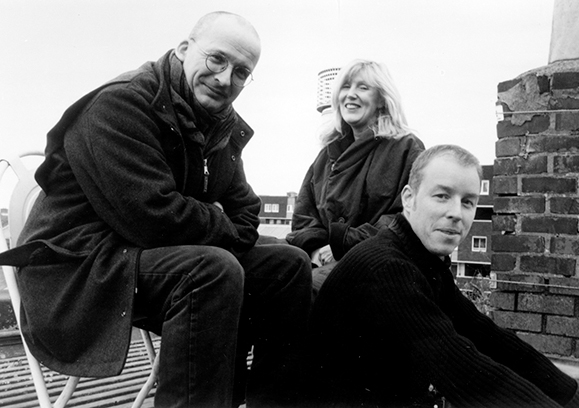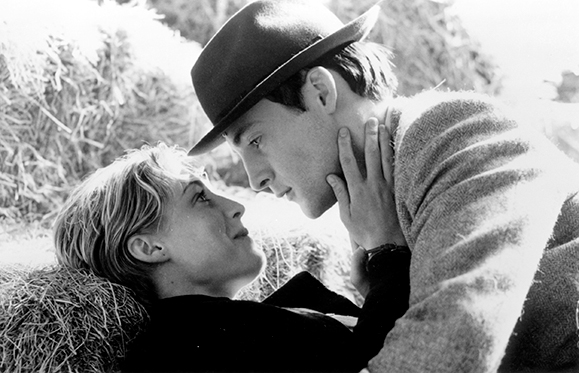The first original screenplay by Irish novelist Roddy Doyle is automatically a cinematic and literary event. When Brendan Met Trudy offers many quirky delights, but it is an uneven and ultimately disappointing film. Doyle’s oddball yarn about a movie-obsessed Dublin schoolteacher (Peter McDonald) who falls in love with a thief (Flora Montgomery) is dragged down on screen by its willful narrative incoherence and by McDonald’s utterly charmless performance.
Doyle’s Barrytown Trilogy has served as the source of the highly entertaining Irish films The Commitments, The Snapper, and The Van. When Brendan Met Trudy similarly displays Doyle’s gift for colorful yet believable dialogue and his sensitivity to the seriocomic rhythms of ordinary life. But he is dealing here with characters somewhat more exotic than most of his Barrytown folk, and while his screenplay is refreshingly unpredictable, the plot’s twists and turns become increasingly silly.
It takes a while to realize that When Brendan Met Trudy, amiably directed by Kieron J. Walsh, has more on its mind than spoofing romantic movies, notably the much overrated American film When Harry Met Sally…One tipoff is the Christmas present that Brendan gives one of his uncomprehending nephews, a book on the films of the late French director François Trnffaut. Truffaut was fond of love stories involving shy men and neurotic, dangerous women, as When Brendan Met Trudy turns out to be.
Doyle’s evident inspiration is Truffaut’s 1972 film Une Belle Fille Comme Moi, based on Henry Farrell’s novel Such a Gorgeous Kid Like Me, also the film’s English title. Truffaut’s black comedy/romance stars Bernadette Lafont in a dazzling performance as Camille Bliss, an incorrigible hoodlum who becomes the love object of a nerdy sociologist (André Dussollier) writing a thesis on criminal women. Incongruously, and not always effectively, this self-destructive romantic passion is treated as farce.

Doyle’s protagonist, who is so shy that he often appears catatonic, lives in an apartment filled with movie posters. The place is far too neat and tidy for the kind of dysfunctional personality that lives vicariously through movies. But Doyle has fun skewering the antisocial nature of the film buff who thinks of romance in terms of John Ford’s The Quiet Man and Sergio Leone’s Once Upon a Time in the West, and reacts to life crises by quoting Billy Wilder’s Sunset Boulevard or Mel Brooks’s The Producers.
Brendan’s dismally unreal existence is also reflected in the gag titles glimpsed on the marquee of a Dublin multiplex, such as Aimless Running and The Usual Shite. The satire is amusing but not as darkly ironic as Dennis Potter’s use of popular songs to counterpoint his protagonists’ miserable lives in Pennies from Heaven or The Singing Detective.
The tongue-tied Brendan opens up only when he sings with the church choir. He drifts into a pub one night and despite his painful ineptness at conversation is inexplicably pursued by the lively, irrepressible Trudy. When he invites her to the movies the following Thursday, she thinks he’s inviting her back to the pub. “I love a good pitcher,” she declares. He can’t understand why she fails to show up at a Polish movie he considers “quite possibly the best and the worst film ever made.”
Brendan is so introverted that you often have to strain to hear the actor deliver his lines, particularly since the music often interferes annoyingly with the dialogue. Doyle’s intent seems to be to satirize the sexual frustrations of Irish women in dealing with men whose extreme shyness is actually a form of passive aggression. Brendan is good-looking in a bland way, but it’s impossible for the viewer to understand what this spirited woman sees in him otherwise.
The pair soon commence a wild sex life – wild, that is, on Trudy’s part, for Brendan seems barely awake as she bounces around. But he is a willing tool for her acrobatic, sometimes kinky pursuits. Life seems dreamlike for our lad until he realizes that Trudy is sneaking out at night mysteriously togged out in black.

Here the film pirouettes into bizarre twists and becomes increasingly tongue-in-cheek. Doyle playfully satirizes the mundane craziness of today’s world by showing television news items such as “Nun with Gun” and “Revenge of the Women.” Men are being castrated in Dublin, and when the media luridly speculate that the serial crimes are the work of a gang of angry feminists, Brendan imagines that Trudy is one of them.
Brendan’s worst fantasies prove overly paranoid, but he is drawn into Trudy’s life of crime. He starts behaving in an antic manner in class and gleefully emulates the mannerisms and wardrobe of Jean-Paul Belmondo’s petty criminal in Jean-Luc Godard’s Breathless, the 1959 French Nouvelle Vague classic based on a story by Truffaut.
When Brendan Met Trudy wants us to see this strange romance as a mind-opening, explosively cathartic experience for Brendan. Doyle suggests that Brendan’s dull life needed upsetting and that he is better off as a criminal than as a schoolteacher (Brendan’s headmaster urges him, in clichéd language, to “Choose life!”). But Brendan’s breakdown seems more disturbing than amusing. And we never get to know Trudy well enough for her to seem a three-dimensional character rather than a writer’s whimsical notion of a femme fatale. Their romance seems as improbable at the end of the film as it does at the beginning.
After the jokey end title (“FIN”), the film continues with vignettes spoofing what happens next in the characters’ lives. Gabriel Byrne even shows up in this coda playing a hoodlum (“Sorry. Wrong film”). By this point Doyle seems to be sending up the whole idea of narrative as well as the falsity of feel-good romantic movies. But he fails to deliver a satisfying alternative to the corny romantic clichés to which he mistakenly feels superior. ♦


Leave a Reply